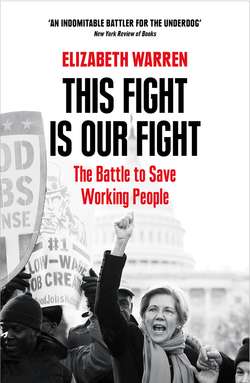Читать книгу This Fight is Our Fight: The Battle to Save Working People - Elizabeth Warren - Страница 25
WITHOUT COPS, ANOTHER CRASH
ОглавлениеAs more and more politicians preached the gospel of markets with few rules and even fewer cops, the role of government quickly changed. Starting in the 1980s, the federal cops—the ones who were supposed to keep the markets honest and competitive—began backpedaling, especially in banking. Timid regulators, timid investigators, timid prosecutors, and timid legislators made it clear that government would do little to help level the playing field or to guard against the kinds of booms and busts that had once wiped out our economy. While these officials looked sideways and shuffled their feet, billions of dollars traded hands as companies sold deceptive mortgages, smashed their smaller competitors, moved operations overseas, devised new tax scams, and rejiggered their own books to make their bottom lines look even rosier. Meanwhile, Republican leaders endlessly repeated the claim that government—not giant corporations—posed a dire threat to our economy.
One by one, the regulatory threads that had been woven together in the 1930s and the decades after were pulled out. What remained was a tattered fabric of laws and regulations that did little to protect people.
And here’s the thing: deregulation worked exactly as we should have expected.
For nearly half a century before Reagan swept into office, the mantra for both banks and bank regulators was “lend money only to people who can show pretty clearly how they will be able to repay.” This was part of what made banking so boring—and what made the economy so stable.
But as regulators started looking sideways in the 1980s, big banks began building high-risk, high-profit portfolios loaded with credit cards. They boosted profits by burying dozens of tricks and traps in the fine print, so that fees were tacked on and interest rates were jacked up long after a purchase was made. Families were losing everything in bankruptcy, while bank profits shot through the roof. Meanwhile, bank regulators looked off somewhere in the middle distance, wearing the same expression as a dog owner who’s pretending that his pooch isn’t pooping on your lawn.
After a decade or so of big profits on credit cards, the banks got an even more delicious idea. Credit cards had become kid stuff; why not target the real money and go after home mortgages? New, much bigger bottles, but it was the same wine. In the 2000s, the banks loaded up mortgages with variable-payment schedules, triggers, high fees, and lots of surprising gotchas buried in the fine print and sold them to unsuspecting buyers. When some buyers couldn’t pay, the banks refinanced the loans, added on new fees and more tricky terms, and started the game all over again. Again, bank profits exploded and regulators looked sideways.
Wall Street wanted in on the deal. This time, financial firms packaged these mortgages into bundles and sold the bundles to pension plans and municipal governments and other naïve customers. Those who purchased the bundles thought they were buying safe, steady investments; they didn’t have a clue about the dangers buried in the risky mortgages. And the bank regulators? Cue the foot shuffling.
There were a zillion variations on how the big banks pulled it off, but the bottom line is this: they made a fortune by cheating people. The bank regulators knew about the swindle and could have shut it down, but they did nothing.
When the housing bubble burst and no one could refinance anymore, the whole scheme came crashing down. And just like the busts leading up to the Great Depression, this crash blasted through the economy. During the financial crisis of 2008, more than twenty-six million people couldn’t find a full-time job. More than nine million families lost their homes. Hundreds of thousands of businesses were shuttered. Entrepreneurship plummeted as fewer Americans started new businesses. College students hit graduation with limited or no job prospects, and those who didn’t go to college faced an even bleaker future. Retirement savings took a nosedive. Thousands of suicides were linked to the crisis.
Overall, the 2008 crash cost the U.S. economy an estimated $22 trillion and more human pain than anyone could ever count.
And yet and yet: even after the crash nearly blew our economy back into the Stone Age, Republicans continued to sing the song of deregulation. In 2010, one bank-friendly congressman declared, “In Washington, the view is that the banks are to be regulated, and my view is that Washington and the regulators are there to serve the banks.” Yeah, the bank regulators served the banks, all right—and they nearly destroyed the American economy in the process.
